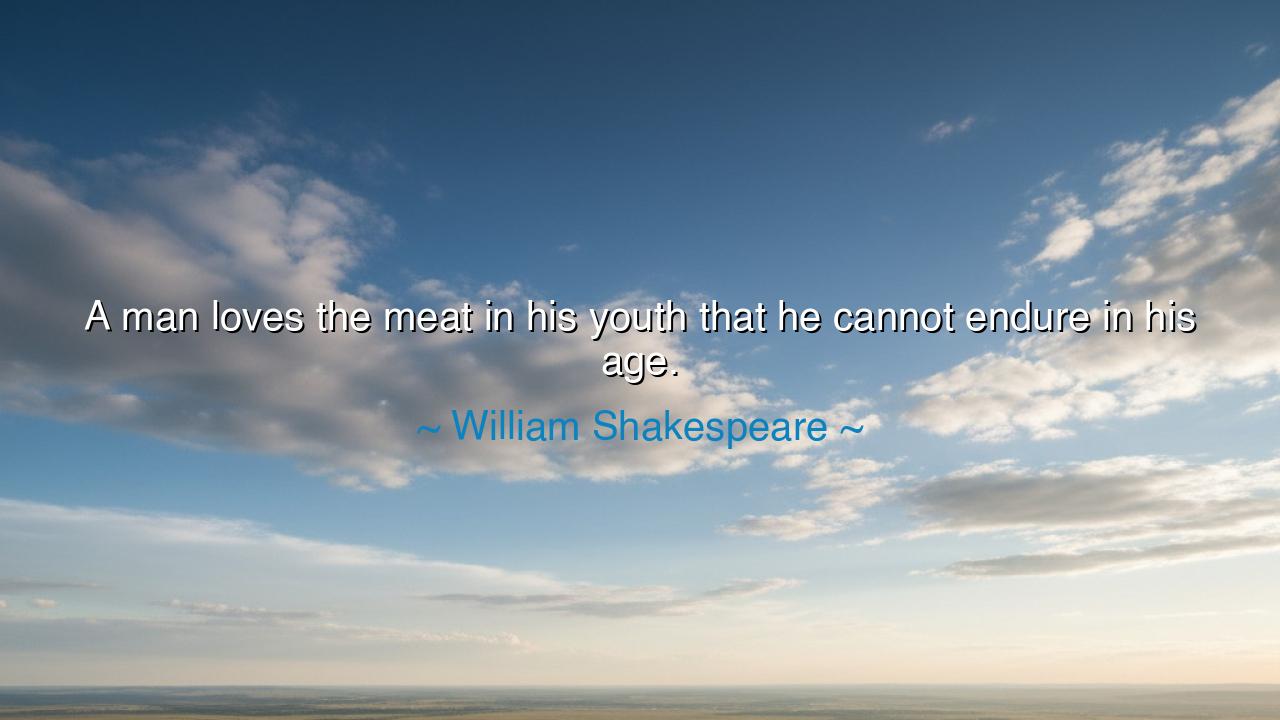
A man loves the meat in his youth that he cannot endure in his






“A man loves the meat in his youth that he cannot endure in his age.”
So wrote William Shakespeare, the poet who understood not only the tongues of kings and jesters but the secret movements of the human heart. These words, found in Much Ado About Nothing, appear simple, almost playful. Yet beneath their surface lies an ocean of truth about time, change, and the evolution of desire. Shakespeare, ever the chronicler of human nature, reminds us that what we cherish in one season of life may become a burden in another—that the heart, like the body, transforms, and that youth’s appetite is not the same as age’s wisdom.
In the literal sense, the line speaks of taste—how the rich meats and indulgences of youth can turn heavy and unbearable to the aging stomach. But as with all things Shakespearean, the physical mirrors the spiritual. The “meat” is not only food—it is a symbol of pleasure, of passion, of the excesses and cravings that burn bright in early years. Youth hungers for intensity, for conquest, for the flavor of experience. But with time comes reflection; the very things that once thrilled the senses may now weary the soul. Thus, Shakespeare does not mock this change—he reveals it as part of the natural order, the quiet transformation that all mortals must face.
Think of the life of King Solomon, who in his youth sought all the delights of the world—riches, women, knowledge, glory. He tasted of everything under heaven. Yet in his old age, he looked upon it all and said, “Vanity of vanities, all is vanity.” The pleasures that once sustained him now filled him with emptiness. His heart, matured and wearied by abundance, had come to crave simplicity, peace, and meaning rather than indulgence. This is the same wisdom Shakespeare speaks of: that the heart’s hunger changes not by chance but by growth, by the refining fire of experience.
There is also a gentle melancholy in the quote. It speaks of the bittersweet truth that every season of life holds its own joys—and that to cling to the desires of youth is to deny the gifts of age. The young run toward the fire; the old sit beside it, content to watch its glow. Yet both are beautiful in their time. Shakespeare reminds us that it is foolish to curse change, for it is change that keeps the spirit alive. The man who cannot endure the meat he once loved has not lost his passion; he has simply exchanged it for a different kind of nourishment—wisdom, moderation, and the deep satisfaction of understanding.
In the history of art, we see this transformation often. Consider Leo Tolstoy, who in his youth wrote War and Peace, a sweeping epic filled with passion, blood, and grandeur. But in his old age, he turned from the sword to the spirit, renouncing wealth and glory in search of moral truth. The fire of his youth became the light of his age. What once was irresistible—the “meat” of earthly triumph—became intolerable to the soul that now yearned for purity. So too do we, if we live long and well, learn to hunger for the eternal rather than the immediate.
Yet, Shakespeare’s wisdom is not a sermon against youth—it is a celebration of life’s balance. Every stage has its rightful appetite. To love deeply, to live boldly, to chase what dazzles—these are sacred acts when one is young. But to know when to let go, to turn from indulgence to introspection, from speed to stillness—that is the work of the wise. The danger lies only in mistaking one season for another, in clinging to old hungers when the soul has outgrown them. A man who feasts forever on the food of his youth will find not joy, but sickness of spirit.
So, my child of time, learn from the turning of your own heart. Do not grieve when your appetites change; rejoice that you have grown. Each desire fulfilled or surrendered is a step toward clarity. There will come a day when the noise you once loved will seem harsh, and the solitude you once feared will feel like home. This is not loss—it is transformation.
Practical teaching: Cherish the passions of your youth, but do not be enslaved by them. As your days unfold, listen to what your heart now needs, not to what it once demanded. Seek not to preserve the fire, but to tend its embers. For as Shakespeare teaches, the measure of a wise life is not how long one loves the same “meat,” but how gracefully one learns to feast upon what truly nourishes the soul—contentment, wisdom, and peace.






AAdministratorAdministrator
Welcome, honored guests. Please leave a comment, we will respond soon